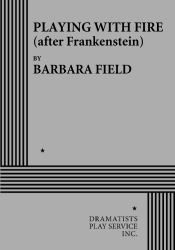Adapted from Mary Shelley’s novel.
THE STORY: As the play begins, an exhausted and dying Victor Frankenstein has finally tracked down his Creature in the lonely, frozen tundra of the North Pole. Determined to right the wrong he has committed by, at last, destroying the malignant evil he believes he has created, Frankenstein finds that he must first deal with his own responsibility and guilt—for, as their fascinating confrontation develops, it is evident that the Creature has become a pathetic, lonely and even sensitive being who wants only to find love and that he, Frankenstein, by intruding into the very secrets of life, is truly the evil one. As the two debate, scenes from the past flash by: Frankenstein’s young bride, whom the Monster killed out of pique when the scientist failed to provide him with a mate of his own; the brilliant, quick-witted Professor Krempe, Frankenstein’s university mentor; and moments between the youthful Victor and his brother, who also fell victim to the Creature’s vengeance. Ultimately the exchange between Frankenstein and the Creature becomes a confrontation between parent and child, scientist and experiment, rejection and love, and even good and evil—culminating in the Creature’s agonizing question, “Why did you make me?” It is a question the exhausted Frankenstein cannot answer and, as the play ends, the Monster lives on, condemned to pass his remaining days in the awful loneliness he has so desperately sought to escape.
This singular, eloquent play deals with events which transpire after those usually associated with the Frankenstein story—in this case the final, fateful meeting between Dr. Frankenstein and his macabre creation amid the barren wastes of the North Pole.
“PLAYING WITH FIRE manages to be both intellectually stimulating and thoroughly engrossing.” —Minneapolis Star Tribune.
“It works almost like poetry—each layer of comprehension uncovers another layer of questions.” —Minneapolis City Pages.
“…powerful, thought-provoking theater.” —St. Louis Post-Dispatch.
“Playwright Field has written a morality play that speaks to some of the most basic concerns of our time.” —Minnesota Public Radio.
